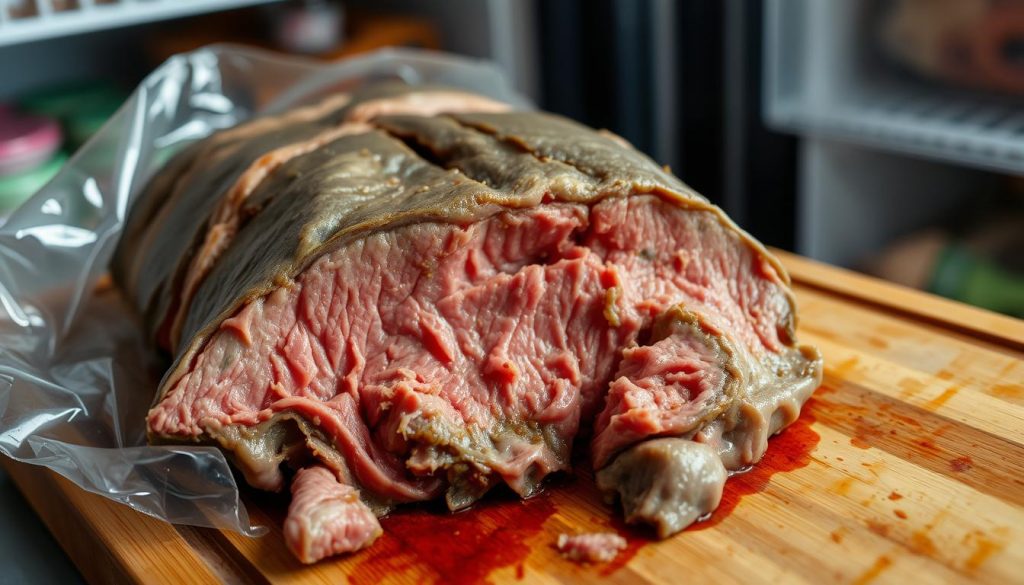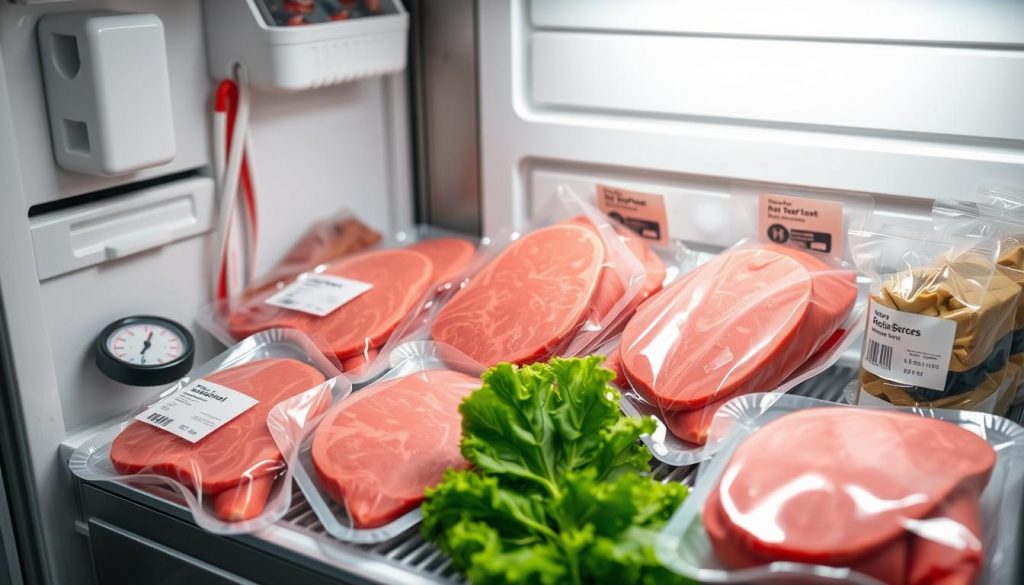We all love a tasty deli roast beef sandwich. But how long can we keep it fresh in the fridge? Let’s explore deli meat storage and roast beef shelf life. This way, our lunch meat stays fresh and safe to eat.
Deli roast beef is a favorite for quick meals. A 50-gram package makes two sandwiches, great for lunch or a light dinner. But, it’s important to store it right to keep it quality and safe.
Unopened deli roast beef can last about two weeks in the fridge. Once opened or sliced, it’s best to eat it in 3-5 days. This keeps it fresh and lowers the risk of foodborne illnesses.
It’s key to remember that not all stores follow expiration dates strictly. We must be careful when buying deli products for food safety. If the roast beef looks slimy, it’s spoiled and should be thrown away.
Key Takeaways
- Unopened deli roast beef lasts about 2 weeks in the fridge
- Opened or freshly sliced roast beef should be consumed within 3-5 days
- Freezing can extend shelf life up to 2 weeks
- Sliminess indicates spoilage and unsafe consumption
- Be cautious of store practices regarding expiration dates
- Proper storage is key for quality and safety
Understanding Deli Roast Beef Storage Basics
Storing our favorite cold cuts right is key. Deli roast beef, a favorite lunch meat, needs special care. This keeps it fresh and tasty. Let’s explore the basics of storing deli meat to keep your sandwiches tasty and safe.
Different Types of Deli Roast Beef
Deli roast beef comes in many cuts and styles. You’ll find top sirloin, eye of round, and top loin often. Eye of round is known for its lean taste and rich flavor. These options give you different tastes and textures for everyone.
Importance of Proper Storage
Storing lunch meat right is vital for safety and taste. Roast beef must cool fast after cooking. It should get below 40°F in four hours. This quick cooling keeps juices in and fats solid, making it easier to slice and keeping the texture good.
Temperature Control Requirements
Keeping the right temperature is essential for cold cuts. Your fridge should stay below 40°F to stop bacteria. Don’t let deli meats sit at room temperature for over two hours. In hot weather over 90°F, cut this time to one hour.
| Storage Method | Temperature | Duration |
|---|---|---|
| Refrigeration | Below 40°F (4°C) | 3-5 days |
| Freezing | 0°F (-18°C) | 2-3 months |
| Room Temperature | 60-70°F (15-21°C) | Max 2 hours |
By sticking to these tips, we can enjoy our deli roast beef safely. And we can enjoy its great taste in our favorite sandwiches and dishes.
How Long Does Deli Roast Beef Last in the Fridge
Deli roast beef is convenient, but knowing its shelf life is key. It’s important for safety and quality. Let’s explore deli meat expiration and roast beef freshness to enjoy your lunch meat at its best.
Unopened Package Shelf Life
Unopened deli roast beef stays fresh for about two weeks in the fridge. This is thanks to the packaging and preservatives used.
Opened Package Duration
After opening, the roast beef’s freshness clock starts. To keep it fresh, eat it within 3-5 days. This rule applies to both pre-packaged and freshly sliced deli roast beef.
Fresh-Sliced from Deli Counter Timeframe
Freshly sliced roast beef from the deli counter also lasts 3-5 days. This ensures the best flavor and safety.
| Deli Roast Beef Type | Refrigerator Shelf Life | Freezer Shelf Life |
|---|---|---|
| Unopened Package | Up to 2 weeks | 1-2 months |
| Opened Package | 3-5 days | 1-2 months |
| Fresh-Sliced from Deli | 3-5 days | 1-2 months |
These times are just guidelines. Always check for spoilage before eating. Keep your deli meats at 40°F or below for freshness.
By following these tips, your deli roast beef will stay fresh and safe. This maximizes its shelf life and your enjoyment of this versatile lunch meat.
Proper Storage Methods for Maximum Freshness
Knowing how to store roast beef is key to keeping it fresh. We’ll show you the best ways to store deli meats safely and keep them fresh.
Optimal Container Selection
Choosing the right container is important. Airtight containers or resealable bags are best. Glass containers with tight lids are also great. These options help keep air out, making your roast beef last longer.
Wrapping Techniques
Wrap your deli roast beef tightly in plastic wrap or foil before storing. This prevents moisture loss and keeps the meat moist. For packaged deli meat, it’s best to keep it in its original packaging unless told to do differently.
Storage Location in Refrigerator
Where you store your deli meat in the fridge is important. Place it in the coldest part, usually the back of the bottom shelf. Keep it away from the door to maintain a steady temperature. Your fridge should be at or below 40°F (4°C) for food safety.
| Storage Duration | Unopened Package | Opened Package |
|---|---|---|
| Refrigerator | Up to 2 weeks | 3-5 days |
| Freezer | Up to 2 months | Up to 2 months |
By using these storage tips, you’ll keep your deli roast beef fresh. Always label containers with the date to track freshness. Proper storage ensures you enjoy your deli meats safely and deliciously.
Signs of Spoilage in Deli Roast Beef
Knowing when to discard lunch meat is key for food safety. We’ll show you how to spot spoiled deli meat, like roast beef. By recognizing these signs, you can avoid eating harmful food.

Color changes are often the first sign. Fresh roast beef is pinkish-red. Gray, brown, or green spots mean it’s spoiled. Unusual smells, like sour or rancid, also warn of spoilage.
Texture is also important. If your deli roast beef feels slimy or sticky, it’s growing bacteria. A tacky or film-like texture is a clear sign to throw it away. Remember, these changes can happen before the expiration date, so always trust your senses.
“Changes in color, odor, stickiness, sliminess, or mold indicate spoilage and necessitate disposal.”
To quickly spot spoiled deli meat, here’s a checklist:
- Discoloration (gray, brown, or green spots)
- Off-putting odors
- Slimy or sticky texture
- Visible mold growth
- Unusual taste (though tasting is not recommended for safety)
If your roast beef shows any of these signs, it’s best to discard it. Eating spoiled deli meat can cause foodborne illnesses. These are very dangerous for pregnant women and people with weak immune systems.
| Storage Method | Shelf Life | Signs of Spoilage |
|---|---|---|
| Unopened package | Up to 2 weeks | Color change, odor, texture |
| Opened package | 3-5 days | Sliminess, off smell, discoloration |
| Fresh from deli counter | 3-5 days | Sticky surface, mold, rancid odor |
Freezing Deli Roast Beef for Extended Storage
Freezing deli meat is a smart way to keep it fresh longer. About 25% of recipes use deli roast beef, but only 10% freeze it. Let’s look at how to freeze and thaw your favorite lunch meat right.
Freezing Guidelines
To keep frozen roast beef at its best, store it at 0°F (-18°C) or colder. It’s safe to keep it frozen forever, but for the best taste, use it within 1-2 months. The Midwest is the leader in freezing, with 30% of recipes suggesting it, compared to just 5% in the South.
Proper Packaging Methods
To avoid freezer burn, wrap your deli roast beef tightly in plastic wrap before freezing deli meat. You can freeze it sliced or unsliced. Freezing it sliced makes thawing faster. Make sure to remove as much air as you can from the packaging to keep it fresh.
Thawing Procedures
For thawing lunch meat, the fridge is the best place. Move the frozen roast beef to your fridge and use it within 3-5 days if you froze it right after buying. For pre-packaged, unopened products, you can keep them in the fridge for up to 2 weeks after thawing.
| Storage Method | Temperature | Duration |
|---|---|---|
| Freezer | 0°F (-18°C) | 1-2 months |
| Refrigerator (after thawing) | 40°F (4°C) | 3-5 days |
| Refrigerator (pre-packaged, unopened) | 40°F (4°C) | Up to 2 weeks |
By following these tips, you can enjoy your deli roast beef for longer without losing its taste or safety.
Food Safety and Handling Tips
Proper deli meat food safety begins with clean hands. Always wash them before touching roast beef or any deli meats. Using clean utensils and cutting boards helps prevent cross-contamination, a key step in avoiding foodborne illness.
Keep your deli roast beef chilled. The fridge should be at or below 40°F. Don’t leave meat out for more than two hours – bacteria thrive at room temperature! When serving, use clean plates and avoid touching the meat directly.

Be extra cautious if you’re pregnant, have young kids, or a weakened immune system. These groups are more at risk for Listeria and other food-related illnesses. When handling roast beef, remember these timeframes:
| Type of Deli Meat | Refrigerator Storage | Freezer Storage |
|---|---|---|
| Unopened pre-packaged | 2 weeks | 1-2 months |
| Opened package | 3-5 days | 1-2 months |
| Freshly sliced from deli | 3-5 days | 1-2 months |
By following these guidelines, we can enjoy our deli meats safely and deliciously. Remember, when in doubt, throw it out! It’s better to be safe than sorry when it comes to food safety.
Impact of Processing Methods on Shelf Life
Processing methods are key to how long deli roast beef stays fresh. The choice between natural and processed roast beef impacts taste and shelf life. Let’s dive into the world of deli meat preservatives and their effects.
Preservatives and Their Effects
Deli meat preservatives are vital for longer shelf life and quality. Conventional roast beef often has additives like sodium nitrite, salt, and phosphates. These help keep the meat fresh, preserve its color, and texture.
Nitrite-free lunch meat is becoming more popular. It uses preservatives like celery extracts, which have natural nitrates. Though they may not last as long, they’re a hit with health-conscious folks.
| Type of Deli Meat | Shelf Life Unopened | Shelf Life Opened |
|---|---|---|
| Roast Beef | Up to 2 weeks | 3-5 days (vacuum-sealed) |
| Turkey Breast | 1-2 weeks | 3-5 days (airtight container) |
| Sliced Ham | 1-2 weeks | 3-5 days (original packaging) |
Natural vs. Conventional Processing
The debate on natural vs. conventional processing goes on. Natural processing uses fewer additives, focusing on methods like smoking or curing. Conventional processing leans on synthetic preservatives for longer shelf life.
Our research indicates conventional roast beef lasts longer than natural. Pre-packaged cold cuts can last 2-3 weeks unopened. Freshly sliced meats last 3-5 days. Always check for spoilage before eating.
Best Practices for Purchasing Deli Roast Beef
When buying deli meat, like roast beef, we should shop smart. Choosing the right roast beef means getting the freshest, tastiest meat that lasts longer. Here are some tips to help you make a great choice next time.
First, look at the sell-by or use-by date on pre-packaged roast beef. For freshly sliced meats, ask the deli staff when it was made. This tells us how long it will stay fresh at home.
Go for reputable delis or stores with lots of turnover. These places usually have fresher products. Remember, sliced lunch meat from the deli counter stays good for 3-5 days in your fridge.
- Buy only what you can eat within 3-5 days
- If buying in bulk, plan to freeze portions
- Ask about ingredients and processing methods
Deli meats can last up to six months in the freezer. If you’re not using your roast beef right away, freezing is a good choice to keep it fresh longer.
| Type of Deli Meat | Refrigerator Shelf Life | Freezer Shelf Life |
|---|---|---|
| Unopened Pre-packaged | 2 weeks | 6 months |
| Opened Package | 3-5 days | 1-2 months |
| Fresh-Sliced from Deli | 3-5 days | 1-2 months |
By following these tips, we can enjoy fresh, delicious roast beef. This way, we reduce waste and keep our food safe.
Temperature Danger Zone Considerations
Understanding the deli meat danger zone is key to food safety. We must know the critical temperature points. This helps prevent time-temperature abuse and keeps deli roast beef safe.
Critical Temperature Points
The danger zone for deli roast beef is between 40°F and 140°F. In this range, harmful bacteria can grow fast, posing a health risk. To stay safe, keep deli meats refrigerated at or below 40°F.
This simple step can help reduce bacteria like Listeria monocytogenes. Even in cold temperatures, these bacteria can thrive.
Time Limitations
Time is important in food safety. Never leave deli roast beef at room temperature for more than 2 hours. If it’s hotter than 90°F, this time drops to 1 hour.
When moving deli meat, use insulated bags or coolers to keep it safe. Refrigerating or freezing deli roast beef quickly after purchase or use is essential. This prevents bacterial growth.
By following these guidelines, we can lower the risk of foodborne illnesses from deli meats. Always prioritize food safety to enjoy your deli roast beef worry-free.




